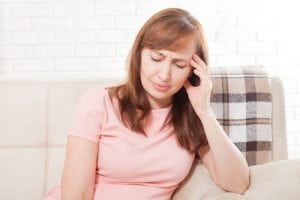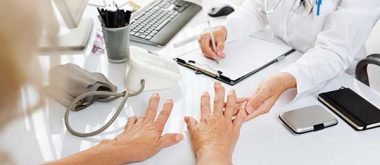Every woman is unique and will experience menopause differently. Menopause symptoms can appear in many different shapes and sizes. It is important to make sure that what you are experiencing is menopause itself and not something else entirely.
What is Menopause ?
Menopause is the normal, natural transition that occurs for women 45-55 years of age. During menopause your ovaries will reduce in size and begin to decrease the amount of hormones that they produce. Hormones that are produced in the ovaries, such as estrogen and progesterone, work to control the menstrual cycle. Due to these changes a woman’s egg count is depleted and fertility will begin to decline. Research shows that menopause, while not common, can affect women as early as their 30’s. This is known as premature menopause or premature ovarian insufficiency.
Perimenopause and Symptoms
Many women suffer from signs and symptoms of menopause before actually going through it. Research shows this period can last between 3-5 years. These signs and symptoms are known as premenopause or perimenopause. This usually occurs from mid to late thirties to forties or fifties.
Signs and symptoms of perimenopause can include:
- Hot flashes
- Sleep disturbances/ insomnia
- Elevated heart rate
- Night sweats
- Mood changes – anxiety, irritability, and depression
- Loss of sexual desire
- Vaginal dryness or discomfort during sexual intercourse
- Urinary issues
- Weight gain
- Dry skin and hair loss
Causes for Perimenopause
- Natural aging
- Hysterectomy (uterus removed) – symptoms could appear gradually
- Oophorectomy (ovaries removed) – symptoms could appear immediately
- Premature Ovarian Failure (POF) – Is caused by underactive and inactive ovaries due to surgery, cancer treatments, or genetics. Ovarian function or insufficient follicles can also cause POF.
- Primary Ovarian Insufficiency (POI) – Women who have no or only occasional periods and elevated FSH levels, which is a sign for fewer eggs within the ovary.
- Underweight body composition
Menopause and Symptoms
Menopause is defined as the final menstrual period and is confirmed once a woman has not had her period for 12 consecutive months without experiencing illness, pregnancy, medication, or breastfeeding. The transition from perimenopause to full menopause can take between 1-3 years. Every woman is unique and will experience menopause differently. Typically it is common for women to experience menopause similar and around the same time as their mothers and sisters.
Signs and symptoms of menopause can include:
- Hot flashes
- Night sweats
- Sleeplessness
- Vaginal dryness
- Irritated skin
- More frequent urinary incontinence and/or urinary tract infections
- Low mood
- Reduce interest in sex
All of these symptoms are associated with the body’s new decrease of oestrogen. Oestrogen is one of the more dominant female sex hormones. It is used by the body for puberty, the menstrual cycle, pregnancy, bone strength, and maintaining healthy cholesterol levels. Oestrogen has the power to also affect the brain, heart, and skin.
Post-menopause and Symptoms
Post-menopause begins once one full year has passed from your last period. At this stage the ovaries have stopped releasing eggs and producing most of their estrogen.
Symptoms that may occur during this stage can include:
- Hot flashes
- Night sweats
- Elevated heart rate
- Sleep disturbances- insomnia
- Mood changes- depression, irritability, and anxiety
- Urinary issues
- Vaginal dryness- which may cause discomfort during sexual intercourse
When to Seek Help
It is often possible to manage the symptoms of menopause without intervention. However, if any of these symptoms or signs is particularly intense or difficult to cope with, it may be time to seek help from your doctor. Likewise, if you find that your emotional menopausal symptoms are hard to manage or damage your quality of life then seeking out a doctor might be right for you.
It is natural for some symptoms to continue after menopause, however, if you experience vaginal bleeding after confirmed menopause you should seek help from your doctor.








